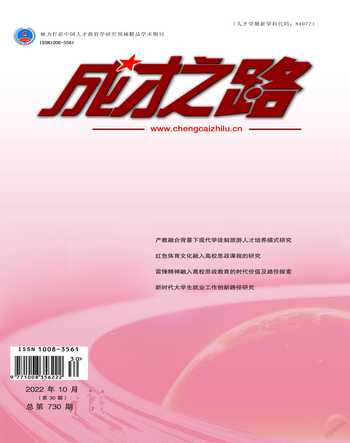英语阅读教学中学生思维能力的培养研究
侯萍
摘要:学生正处于思维发展的黄金时期,教师在英语阅读教学中培养学生的思维能力,不仅能使学生更好地理解和掌握英语知识,还能激发学生的创新性思维,实现英语知识的迁移与应用。文章从英语阅读教学中学生思维能力发展的重要性出发,结合实践提出具体的教学策略:创设情境进行教学导入,激发学生的阅读思考;设计活动引导深入阅读,锻炼学生的思维能力;丰富素材引导拓展学习,促进学生的拓展思考。
关键词:小学英语;阅读教学;思维能力;培养策略
中图分类号:G421;G623.31文献标志码:A文章编号:1008-3561(2022)30-0069-04
在新课程改革不断推进的背景下,培养学生的学科核心素养已成为学科育人价值的重要体现。当前,学生正处于思维发展的黄金时期,教师在英语阅读教学中培养学生的思维能力,不仅能促进学生更好地理解和掌握英语知识,还能激发学生的创新性思维,实现英语知识的迁移与应用。具体来说,在英语阅读教学中,教师可从以下几个方面培养学生的思维能力。
在阅读课堂上,学生如果没有尽快进入主题,会导致思维游离,兴趣索然,难以进行有效思考。为此,教师可以采用情境教学方法设计多样化的导入活动,引导学生了解本节课的主题,并在参与互动中进入主题,调动知识与经验,激活自己的思维。
1.构建开放的学习情境,引导学生在头脑风暴中进行主动思考
例如,在“Animals in danger”的教学设计中,教师在导入环节设计头脑风暴活动,调动学生的思考兴趣。具体来讲,在Lead-in环节,可这样设计。
T:Fuwa are the mascots of the 29th Beijing Olympic Games,students are familiar with them. So I use it to lead in my lesson. Can you say which one rep- resents the pandas and antelope?
T:Yingying is a lovely and interesting cartoon antelope,and Jingjing is a naive panda. Do you know their meanings?
And then show some terrible pictures about the pandas and the Tibetan antelopes. Facing the terrible scenes,what should we do to protect them?
S1:Build up wildlife nature reserves.
S2:Punish acts that harm wildlife.
T:Luckily,many people are active in protecting the antelopes. Today we’ll learn more about it.
這一环节属于头脑风暴,其目的在于激发学生对话题的兴趣,让学生学习关于大熊猫、藏羚羊等濒危野生动物的词汇,为接下来的交流讨论做好准备。
2.设计层次化情境,引导学生对主题的深入思考
在传统的教学模式中,教师通常占据着课堂提问的主动权,学生在教师一个又一个问题的推动下进行学习,缺乏探究问题的热情,思维能力发展自然也会受到限制。对此,在英语阅读指导中,教师可以创设教学情境,向学生提出思考问题,鼓励学生自主提问,并通过课前活动调动学生的思维,让学生在分析、解决问题的过程中提升思维能力。
在“Animals in danger”的阅读指导中,教师为引导学生探究思考问题,可以进行如下设计。
(1)Show the students the animals on the screen as many as you can. The students review the animals’ names.(They may say them in Chinese.)
(2)Ask the students look at the picture on text. Let the students talk about it. Then ask them to say what they know about the Siberian tiger. Finally ask the students to read the information in the box. The students talk about the picture and say what they know about the Siberian tiger.(The students ask their own questions about the Siberian tiger.)
(3)Read through the words with the whole class,pay attention to their stresses. Ask the students to complete the task individually the check the answers.(The students ask the questions according to the words.)
(4)Ask the students to work in groups and discuss which reason is the most important. The students have a discussion,and answer the questions,show their opinions.
在這个案例中,教师先列举案例并展示图片,引出所要学习的有关野生动物的单词,并鼓励学生根据自己所了解的信息提出问题。接着教师为不同层次的学生提供表达的机会(英语基础欠佳的学生可以根据图片信息了解与动物相关的单词,英语基础较好的学生可以利用新知识进行自我表达,体会自主学习带来的满足感)。最后教师通过团队活动,引导学生讨论,培养学生积极与他人合作的精神,提高学生分析问题、解决问题的能力。
3.设计对比情境,提升学生思维的深刻性
学生的抽象思维能力不足,对问题的思考常常缺乏深度。对此,教师应该把握中高年级学生的思维特点,有意识地设计对比教学,让学生在阅读对比中深入思考,提高思维的深刻性。
例如,在“Healthy or unhealthy?”的教学设计中,教师利用多媒体课件为学生展示两组学生的生活。
(1)Tim and Judy. Tim and Judy eat a lot of fruit and vegetables. They eat a lot of rice and drink a lot of water. They eat some fish,chicken and eggs. They also drink some milk. They eat a little sweet food. They often play sport. They are strong and healthy.
(2)Lily and Bob. Lily and Bob eat a lot of candy,hamburgers,ice cream and chocolate. They drink a lot of cola. Lily and Bob do not play sport very often. They are fat and unhealthy.
学生根据图片展示以及教师的介绍,了解两种不同的生活方式,并思考自己日常生活的状态,能分辨出健康和不健康的饮食与生活习惯,认识到健康生活的重要性。
在英语阅读教学中,教师可以借助各种教学资源,启发学生对文本进行深入的探究、思考,并逐渐实现从感性到理性的过渡,为学生的理性思维奠定基础。
1.利用感官刺激,培养学生的形象思维
对于中高年级学生而言,他们在认识事物的过程中主要依靠形象思维,视频、动画、图像等信息都可以引发他们的兴趣,激发学生的形象思维。在英语阅读中,教师应合理利用这些生动形象的教学资源,引导学生在观察中产生疑问,锻炼思维。例如,在“Changes in our lives”的第一课时教学设计中,为了培养学生的形象思维,教师进行了如下设计。
(1)Play the songs in"listen and enjoy",and let students feel the rhythm of language,activate the classroom atmosphere. Ask students to observe the pictures in the textbook and make them to talk about the difference between past and present life.
(2)The teacher shows the two pictures from his childhood and now. Ask the students the questions.
T:This is a photo of me in the past. This is a photo of me now. What are the differences?
S1:You had short hair in the past. Now you have long hair.
S2:Yours hands were small in the past. Now they are big.
(3)Show cards about jobs. Ask the students what does he do?
在这一教学案例中,教师利用音乐、图片等能够引发学生形象思维的教学资源设计教学环节。通过感官体验,学生能够产生思考和探究的欲望,进而在形象思维的推动下进入阅读环节,探究“Changes in our lives”这一主题。
2.设计多元化教学活动,促进学生的理性思考
在中高年级英语阅读指导中,教师要为学生搭建思维发展的平台,让学生实现从感性思维到理性思维的过渡。
例如,在“Great cities of the world”的阅读指导中,教师设计了如下教学活动。
(1)Ask students to read the text and understand the main ideas.
(2)Design problems and grasp the details of the article. Ask questions according to the content. Such as"Where is Beijing?What can tourists find in Beijing?What do people in Beijing like eating?"
(3)Encourage students to ask questions and analyze the text independently. Understand the introduction of Tokyo and London in the text.
这样的教学设计,符合学生思维由浅入深、层层递进的发展规律。因此,教师要为学生的自主阅读提供机会,并通过示范提问引导学生掌握文本的结构,进行方法迁移,以实现自主阅读,锻炼思维能力。
再如,在“Seeing a film”的教学设计中,教师为学生展示一幅地图,并设计问题,以调动学生学习的热情,促进学生思考并掌握日常的表达。
T:Where is the toilet?Can you tell me the way to the toilet,please?
S1:(在教师的提示下回答)Go along this street,and turn right, the toilet is on your right.
T:Excuse me,can you tell me the way to the bus station?
S2:Go along this street.
學生的回答并不清晰,教师需要通过追问促使学生通过仔细观察地图来完善表述,并运用at the third crossing这一短语。
T:At here,turn left?Tthen at here?
S2:Go along this street,then turn left at the third crossing,the bus station is on your left.
这样的教学活动设计比较灵活,能为学生自主对话提供机会,让学生在交流中活跃思维,提高对本节课重点内容的把握程度,进而提高阅读效果。
三、丰富素材引导拓展学习,促进学生的拓展思考
在英语阅读指导中,教师不仅要重视学生对阅读文本的把握,还要有意识地引导学生进行巩固复习、拓展迁移,在消化与运用知识的过程中提升思维能力。在英语课后阅读指导中,可选择的拓展活动十分丰富,教师可结合学生思维能力发展的需要进行选择、设计与组合。
1.把握课内外联系,引导学生发散思维
在高年级英语阅读指导中,教师应把握课内外之间的联系,借助课内话题促使学生发散思维、展开想象,并给予他们发挥的空间。这样,既可以拓展文本,也可以培养学生的语言运用能力,锻练学生的发散思维能力。
例如,在“Visiting museums”的教学设计中,教师可先根据教材中“Culture corner”的内容,引导学生了解中国故宫博物院和法国卢浮宫博物馆的馆藏文化,丰富学生对博物馆相关知识的了解,激发学生的探索热情。接下来,教师为学生展示更多的博物馆图片,并设计对话。
T:(Show the picture of Science museum)What can you see in Science museum?
S1:I can see a lot of robots in Science museum.
T:(Show the picture of Insect museum)What can you see in Insect museum?
S2:I can see a lot of insects in Insect museum.
最后,教师将学习的主动权交给学生,利用多媒体展示art museum/film museum/car museum/toy museum的图片,并要求学生按照之前的对话框架进行交流,分享自己参观博物馆的经验,以培养发散思维能力。
2.设计拓展问题,促使学生拓展思考
例如,在“Changes in our lives”的深入阅读中,教师立足学生的主体地位,设计了如下活动。
(1)Review the vocabulary and grammar of this lesson. Ask the students have a discussion with"What do you want to be?".
T:We have learned more about different jobs in this unit. What do you want to be in the future?Why?
S1:In the future,I want to be a writer. I want to write books for children.
S2:I want to be a teacher. I like children.
(2)Divide the students into groups of four,ask questions about what they have learned,and then organize communication in the group.
T:What did you do in the past week?Think about it and write down at least three things in the table. Then talk about in groups.
S:I rode a bike last Sunday. I went to the badminton club on Tuesday evening. I read a storybook on Thursday afternoon.
(3)Ask students to look up some old photos of the city several years ago. Ask students to discuss according to the classification of population,housing,transportation and life,and sort them into tables.
这样的教学设计,能促使学生在阅读的基础上复习巩固知识,并结合阅读理解对所学内容进行拓展、延伸。而且学生在学习活动中可以建立记忆链接,实现知识的迁移,并在开放性的问题中培养发散思维能力,提高思维的灵活性和广阔性。
总之,在英语阅读教学指导中,教师应根据学生核心素养发展要求设计教学策略,引导学生在生动的情境中主动进行阅读思考,在问题的引导下深入探究,在拓展迁移中创新发展。教师还要在教学中结合实践,为学生英语阅读中的思考探究创造条件,进而提升学生的思维能力。
参考文献:
[1]周燕芬.小学英语阅读教学中思维品质的培养初探[J].英语广场, 2020(27).
[2]時娟.在小学英语阅读教学中培养学生的批判性思维[J].华夏教师,2020(16).
[3]吴春梅.优化问题设计提升思维能力———以人教版PEP六上Unit 5 What Does He Do?Part B Read And Write为例[J].英语广场,2020(06).
[4]沈国锋.小学英语高年级语篇教学情境创设探微[J].中小学外语教学,2011(06).
[5]胡虹.英语教学中思维能力培养再思考[J].中学生英语,2021(28).
[6]黄文卿.提高小学高年级英语阅读教学有效性的三个方法[J].广西教育,2020(37).
[7]张娟.浅谈英语教学中学生思维能力的培养[J].校园英语,2011(07).
[8]石慧,宋振杰.浅谈英语教学中学生思维能力的培养[J].山东教育, 2001(32).
[9]戴天扬.例谈小学英语阅读教学中学生思维能力的培养[J].小学教学设计,2018(30).
[10]王晓燕.小学英语教学中如何培养学生的思维能力[J].英语教师, 2017(11).
[11]乔静秀.小学中高年级英语阅读教学中学生思维能力培养策略探究[J].英语教师,2019(14).
[12]陈宽.小任务,大乾坤———谈小学英语阅读教学中思维能力的培养[J].校园英语,2018(09).
A study on the Cultivation of Students’ Thinking Ability in English Reading Teaching
Hou Ping
(Jingjiang New Century Primary School, Jiangsu Province, Jingjiang 214500, China)
Abstract: Students are in the golden period of thinking development. Teachers can cultivate students’ thinking ability in English reading teaching, which can not only enable students to better understand and master English knowledge, but also stimulate students’ innovative thinking, and realize the transfer and application of English knowledge. Based on the importance of the development of students’ thinking ability in English reading teaching, this paper puts forward specific teaching strategies in combination with practice; design activities to guide in-depth reading and exercise students’ thinking ability; enrich the materials to guide the expansion of learning and promote students’ expansion thinking.
Key words: primaryschoolEnglish; readingteaching;thinkingability; cultivation strategy

